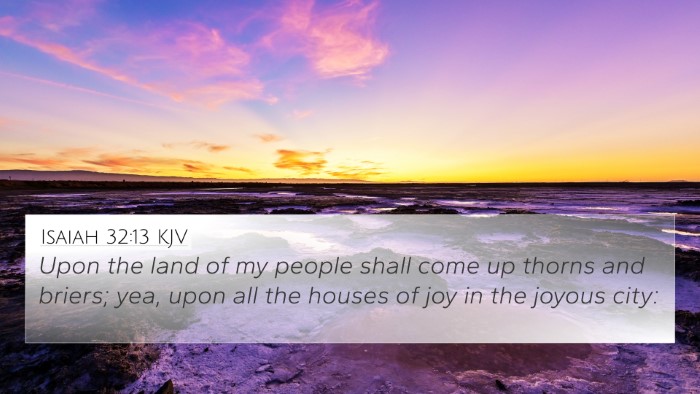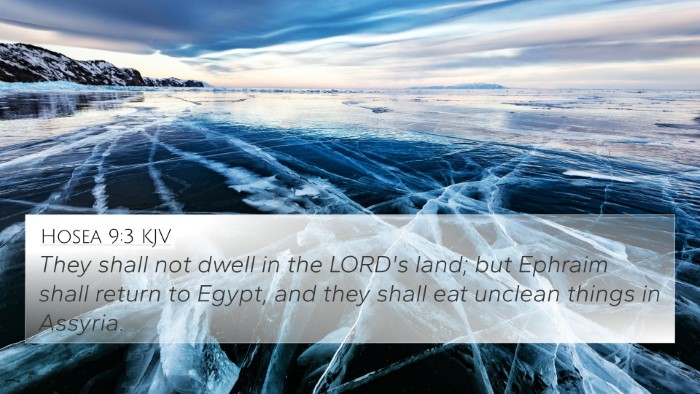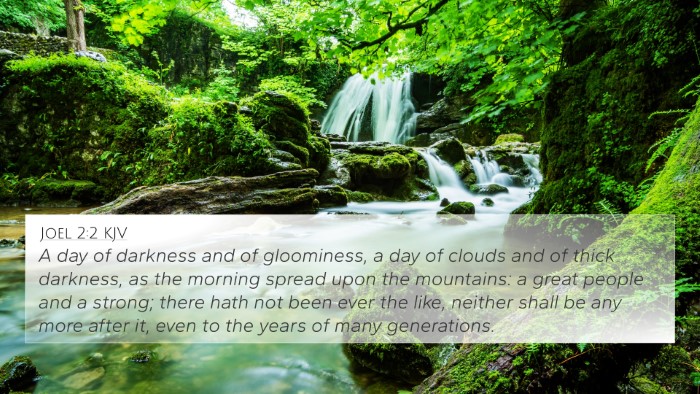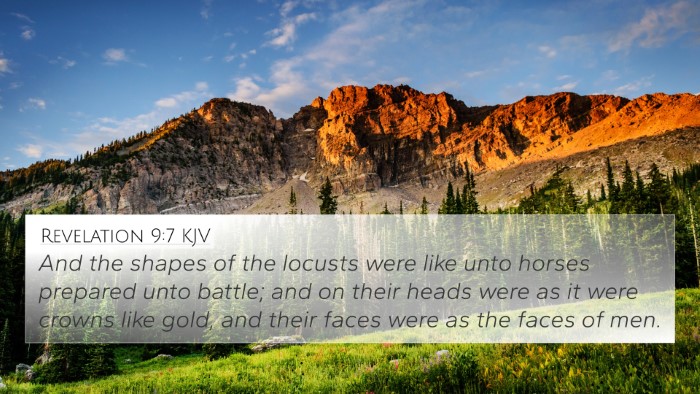Old Testament
Genesis Exodus Leviticus Numbers Deuteronomy Joshua Judges Ruth 1 Samuel 2 Samuel 1 Kings 2 Kings 1 Chronicles 2 Chronicles Ezra Nehemiah Esther Job Psalms Proverbs Ecclesiastes Song of Solomon Isaiah Jeremiah Lamentations Ezekiel Daniel Hosea Joel Amos Obadiah Jonah Micah Nahum Habakkuk Zephaniah Haggai Zechariah MalachiJoel 1:6 Similar Verses
Joel 1:6 Cross References
For a nation is come up upon my land, strong, and without number, whose teeth are the teeth of a lion, and he hath the cheek teeth of a great lion.
Uncover the Rich Themes and Topics of This Bible Verse
Listed below are the Bible themes associated with Joel 1:6. We invite you to explore each theme to gain deeper insights into the Scriptures.
Joel 1:6 Cross Reference Verses
This section features a detailed cross-reference designed to enrich your understanding of the Scriptures. Below, you will find carefully selected verses that echo the themes and teachings related to Joel 1:6 KJV. Click on any image to explore detailed analyses of related Bible verses and uncover deeper theological insights.

Joel 2:25 (KJV) »
And I will restore to you the years that the locust hath eaten, the cankerworm, and the caterpiller, and the palmerworm, my great army which I sent among you.

Psalms 107:34 (KJV) »
A fruitful land into barrenness, for the wickedness of them that dwell therein.

Proverbs 30:14 (KJV) »
There is a generation, whose teeth are as swords, and their jaw teeth as knives, to devour the poor from off the earth, and the needy from among men.

Isaiah 32:13 (KJV) »
Upon the land of my people shall come up thorns and briers; yea, upon all the houses of joy in the joyous city:

Isaiah 8:8 (KJV) »
And he shall pass through Judah; he shall overflow and go over, he shall reach even to the neck; and the stretching out of his wings shall fill the breadth of thy land, O Immanuel.

Hosea 9:3 (KJV) »
They shall not dwell in the LORD's land; but Ephraim shall return to Egypt, and they shall eat unclean things in Assyria.

Joel 2:2 (KJV) »
A day of darkness and of gloominess, a day of clouds and of thick darkness, as the morning spread upon the mountains: a great people and a strong; there hath not been ever the like, neither shall be any more after it, even to the years of many generations.

Revelation 9:7 (KJV) »
And the shapes of the locusts were like unto horses prepared unto battle; and on their heads were as it were crowns like gold, and their faces were as the faces of men.
Joel 1:6 Verse Analysis and Similar Verses
Understanding Joel 1:6
Joel 1:6 is a poignant verse that highlights a critical situation in the land of Judah, referring to an invasion of locusts. This event is not merely a natural disaster but is described by the prophet Joel as a manifestation of divine judgment and a call to repentance. To fully grasp the meaning of this verse, we can draw insights from several public domain commentaries.
Verse Text
Joel 1:6 (KJV): "For a nation is come up upon my land, strong, and without number, whose teeth are the teeth of a lion, and he hath the cheek teeth of a great lion."
Insights from Commentaries
-
Matthew Henry's Commentary
Matthew Henry emphasizes the ferocity and overwhelming nature of the locust swarm, likening it to a powerful army invading the land. The focus on the 'teeth of a lion' symbolizes their destructive capability. Henry suggests that this invasion serves as a divine message, prompting the people to acknowledge their sins and return to God.
-
Albert Barnes' Notes on the Bible
Albert Barnes discusses the metaphorical significance of the locusts as a 'nation' and highlights the collective suffering they inflict on the agricultural landscape. He interprets this as a covenantal curse, reminding readers that the disobedience of Israel led to such calamities.
-
Adam Clarke's Commentary
Adam Clarke elaborates on the symbolism of the locusts, indicating that they are not merely insects but rather an allegory for the invading armies that bring destruction. He points out that the message is directed towards those in power, urging them to recognize their moral failings and take responsibility.
Thematic Analysis
In analyzing Joel 1:6, we can explore several interconnected themes:
- Divine Judgment: The verse serves as a warning about the consequences of disobedience to God’s laws.
- Call to Repentance: The calamity is intended to lead the people to humility and a return to righteousness.
- Community Impact: The invasion affects the entire community, emphasizing collective responsibility.
- Nature's Role in Prophecy: The natural world is used to convey spiritual truths, exemplifying the link between the physical and spiritual realms.
Cross-References
Joel 1:6 can be cross-referenced with the following verses for broader understanding:
- Exodus 10:4-5: Discusses a similar plague of locusts as part of God's judgment against Egypt.
- Isaiah 33:4: Compares the destruction of a nation to the devastation wrought by locusts.
- Revelation 9:3: Describes locusts in a prophetic vision, illustrating their symbolic connection to judgment.
- Deuteronomy 28:38-40: Outlines the curses for disobedience that may include pestilence and crop failure.
- Jeremiah 51:14: Highlights God’s judgment against Babylon, mentioning swarming creatures as instruments of warfare.
- Amos 7:1: Provides an imagery of locusts as a divine threat to Israel’s agricultural bounty.
- Matthew 24:7: References signs of the end times, including natural disasters that can reflect God’s displeasure.
Inter-Biblical Dialogue
This verse opens a dialogue across different biblical texts, illustrating the theme of divine retribution and the importance of repentance in the face of national calamity. Analyzing Joel 1:6 along with the aforementioned verses, one can glean valuable insights into how God communicates His will through the circumstances that befall nations.
Tools for Cross-Referencing
To study the connections between these verses further, one may utilize various tools and resources:
- Bible Concordance
- Bible Cross-Reference Guide
- Cross-Reference Bible Study Techniques
- Bible Reference Resources
Conclusion
Joel 1:6 serves as a multifaceted verse rich in meaning, drawing upon themes of judgment, repentance, and community impact. Through the lens of public domain commentaries and cross-referencing with other biblical texts, we can gain a deeper understanding of its significance in both historical and contemporary contexts.



